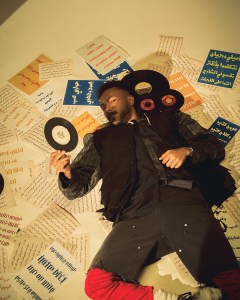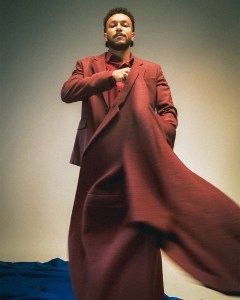Wegz: Constantly Evolving, Always Unpredictable
This interview with Wegz took place just before his album dropped, and what was expected to be a straight talk about music – collaborations, rivalries in Egypt’s rap scene, the making of the record and his shifts between genres – quickly turned into something else.
Wegz approaches every question from a different angle, as if his focus was already on what comes next and the self-development it’s taken to get to this point. The conversation drifted far beyond music: his plunges into diving experiences into the sea, the cherry blossoms of Japan, pursing personal growth, the necessity for calm and simple adventures. From rap, pop and Mahraganat to reflections on curiosity and boredom, he reveals how these pieces fold into his sound.
Speaking over tea, Wegz shared the cities he loves and the music that lets him exist without limits. Both a witness to Egypt’s changing scene and a musician searching for meaning in real time, he shows how personal shifts – fame, solitude, simplicity — bleed into his songs, turning them into glimpses of his mind and soul. This wasn’t a typical Q&A. It was a rare space where Wegz spoke candidly, offering a perspective as unguarded as it was unexpected.

Wegz
Muhammed Mostafa
Wegz and the Sonic Adventure: A Journey from Alexandria Across Genres
In August 2017, Wegz announced on Facebook: “My name is Wegz. I’ve been making rap for just four months, and I’ll drop a track that will blow up in two days.” It was a bold prediction that marked the beginning of an extraordinary journey – from Alexandria’s rooftops to lights of Cairo’s and far beyond. Eight years later, he sits for this August 2025 Billboard Arabia August cover story as one of the region’s most influential artists, a steady presence on the Billboard Arabia charts with a catalogue that reflects both his evolution and his unpredictability. By 2018, Egypt’s hip-hop scene was beginning to erupt, spotlighting new voices from Alexandria, Ismailia, and other cities. Listeners were eager to see how Gen Z would bend technology and culture into something new. Wegz emerged at the heart of that wave, experimenting with rap, trap and Mahraganat while carving out a distinct identity.
Wegz was one of them, testing a space between rap, trap and Mahraganat, and beginning to carve out his own identity. Watching him over the years is like following the thread of a character in constant change: the young, emotional boy who poured his heart into “Saleny” on Alexandria’s rooftops; the fragility he revealed in “Dayra Al Maslaha” with Marwan Pablo; the playful wit of “Bazeet.” Through all these stages, simplicity never disappeared, even as his star kept rising.
With “Kharban,” alongside Mahraganat pioneers Sadat and Amr Haha, he stretched into new territory, while “Dorak Gai,” produced with Molotov, cemented his place in trap Shaabi – its slang and phrases spilling into everyday culture. Then came “Dorak Gai” with producer, Molotov, which cemented his presence in the trap Shaabi scene and spread the phrases and expressions he coined throughout the culture. The track blended Shaabi culture with poetic language, reflecting a clear range of genres.

Wegz
Muhammed Mostafa
That constant movement between styles may partly reflect his ADHD, which he spoke about candidly in our interview. Wegz doesn’t hide it—he admits it and has found ways to cope. “It’s all self-growth. Art is part of life, inseparable from it. Life is beautiful. I try to live it, enjoy what I have, look ahead, and focus on what’s in my hands. I have ADHD. Everyone in Egypt has ADHD—we all know the mischievous but smart kid. That’s all of us.”
Perhaps it was the ADHD, which he now manages by throwing himself into one task until it’s done before shifting to something entirely different. Or maybe it was a childhood spent switching schools again and again, always “the new kid,” as he once recalled. Either way, those experiences shaped how he approaches music: once he masters a sound, he moves on, never lingering in one place for long.
‘El Bakht’: A Turning Point that Captured a Feeling and Connected Millions
During the interview, Wegz answers with careful diplomacy. When asked what he grew up listening to, he only mentions Justin Bieber from his teenage years and the hip-hop duo Mobb Deep. As for Arabic influences, he puts it simply, “All the time you walk the streets, there’s music. That’s Egypt. Every time you go out to buy something, someone is playing a track, so you are constantly hearing everything fresh.”
That ever-present soundtrack of Egypt would later surface in “El Bakht,” released in 2022, the song that was everywhere in Egypt, from concerts and big clubs to tuk-tuks and buses. Its echo spread across the region, quickly became the region’s defining love song for a generation. Carried by an Afro-pop-tinged beat that pushed Wegz into new territory, it was the lyrics that drove its success, above all, their simplicity, that made millions feel it belonged to them.
“El Bakht” raised the stakes for the music scene, blending indie, pop and hip-hop into a sound that felt both fresh and familiar. The track still lives on the Billboard Arabia Hot 100 – currently at No. 40 after peaking at No. 14 – but for Wegz, it was never meant to be a personal benchmark. “It’s not your decision whether people like a song, how they take it, or how far it spreads,” he says. “I have to do something else, to express what I’m going through now. Should I repeat it exactly? No.” For him, the real question is always: What’s next?
In this way, Wegz is always at both a beginning and an end, or perhaps simply in a state of transformation. He turns from a rapper to a pop star, a chart-topper and ultimately a global artist. With each step, he grows wiser and more confident. And although the audience wonders whether his move toward pop with songs like “El Bakht” and “Amira” means leaving rap behind, he remains firm in his position.
Wegz was one of the first to step beyond Egypt’s rap scene, experimenting freely instead of sticking to one genre – something that sometimes left audiences unsure how to define him. But when asked about his place today, his answer was direct: “I’m at the center of Egyptian rap.: “I am in the center of Egyptian rap. I haven’t moved closer or further away. It is what I love and started doing from the beginning, I decided not to stop at it there, because I love rap and I love Mahraganat. These were the first sounds that inspired me to start making music in the first place.”
Stardom Doesn’t Restrict Wegz: His Philosophy of Staying True
Wegz has always sought to stay at the center of hip-hop by pushing into new sounds. In 2024, he released TNKR, an album shaped by rage rap, aiming to bring a new color to the region. “I never stand in the way of evolution,” he told us. “On the contrary, you need to change your location to think better.” The project sounded different from what many expected, but it underscored his commitment to experimenting and expanding his horizons.
He then returned to the trap Shaabi sound with “El-Wad,” which entered peaked in the No. 1 position. It was clear that he had reset his rhythm within the hip-hop scene, delivering sharp lyrics directed at the scene, especially after a wave of comments from other rappers claiming he had left rap behind. That same drive fuels his latest album Aqareb, a title that plays on the Arabic words for both “minutes” and “scorpion.” Blending Afro influences with hip-hop and R&B, it reflects his constant evolution. “Now I feel I need to grow artistically and expand my space,” he says.
He emphasizes that Aqareb is more than a collection of tracks – it’s a cohesive work capturing the emotions of the days and nights he spent making it. The album traces human feelings across a full day, from sunrise to midnight, with each hour carrying its own mood as lived and felt by Wegz. Reaching the top of the Arabic hip-hop and pop scenes at just 27 like living as a scorpion, always on edge, facing danger from the world and from within.
Fame doesn’t seem to tether him; when asked how he handles it, he simply shrugs: “I like to stay grounded, go sit somewhere no one knows me, and live my life as naturally as possible.” He seeks simple joys – walking, breathing fresh air, feeling the sun, visiting Japan, wandering through distant cities during cherry blossom season – turning these moments into emotional snapshots that become lyrics, quietly shared with the world.
This article was originally published in Arabic on BillboardArabia.com.



